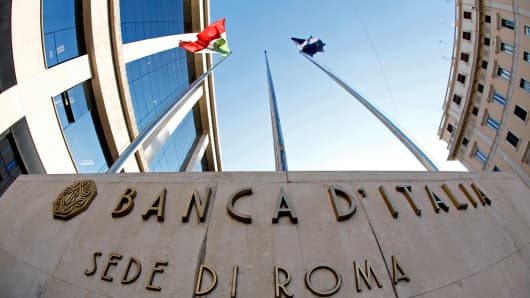The Bank of Italy told Italian banks to further hike provisions they set aside against bad debts to reflect the worsening economic scenario and asked lenders which posted losses not to distribute dividends or bonuses.
The statement came after the central bank carried out an audit of Italian banks' 2012 accounts which forced some lenders to hike their loan loss coverage.
"It is...necessary that the banks adjust their total loan loss provisions to the current and future development of the economic context," the Bank of Italy said.
The central bank added that it expected a "significant reduction" of bonuses on 2012 results.
The Bank of Italy expects the Italian economy to contract by 1 percent this year while rating agency Fitch said it expected gross domestic product to fall by 1.8 percent as it downgraded Italy's sovereign debt rating last year.
A protracted economic crisis has boosted bad loans among Italian banks, which represented on average 12.2 percent of total loans at the end of last year from 4.5 percent in 2007.
The deterioration of the quality of credit has forced banks to hike the coverage of bad debt to 50.6 percent from 42.3 percent before the crisis, the central bank said.
The Bank of Italy's recommendations triggered an initial sale of Italian bank stocks on Thursday. Shares in Intesa Sanpaolo, UniCredit, UBI Banca, Banca Popolare di Milano and Banco Popolare fell before regaining ground.
The FTSE MIB in Italy briefly pared gains on the news, but traded 1.84 percent higher on Thursday afternoon.
The central bank, which is responsible for oversight of domestic banks, conducted confidential inspection lasting two or three months at 20-30 large listed banks, two sources told Reuters earlier this month.
The soundness of the country's real estate sector was also questioned, even though Italy does not face a Spanish-style property crisis.
The sources said the central bank told banks to be more rigorous when assessing the value of real estate assets, which do not always reflect the fall in real estate market prices.
The move was largely expected, one analyst told CNBC.
"It's not a surprise, we've seen this coming and it's been expected based on the accumulation on non-performing loans that these banks have and the fact that their provisions have clearly not kept pace with these," Michael Symonds, credit analyst at Daiwa Capital Markets, told CNBC.
"It was right for the Bank of Italy to step in," he added. "We're expecting another difficult year for Italy's banks. But the question now will be how banks that need to raise their capital ratios are going to do this in this difficult economic environment."
Banks with a core Tier 1 ratio below a target set by the central bank - which the central bank did not disclose - have been asked not to pay dividends while those that exceeded the target just by 1 percent had to contain dividends within 50 percent of net profit.
Though he did not identify any individual banks, Symonds stated that it would be a challenge for smaller to medium-sized banks to meet provisional requirements with their already slim operating profits.


